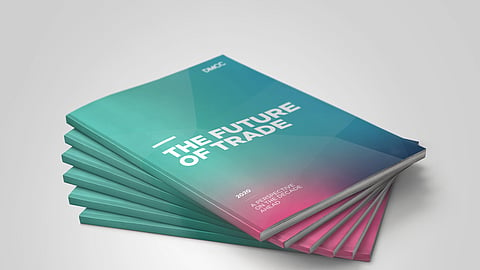DMCC ‘Future of Trade 2020’ Report Highlights Ways to Combat Slowdown
According to DMCC’s latest 'Future of Trade 2020' report there is great potential to boost global trade by trillions of dollars with the application of technology, growth of cross-border services, innovation in trade policy, and trade-related infrastructure development.
DMCC’s flagship thought leadership report – now in its third edition – examines the impact of geopolitics, technology, COVID-19 and global economic trends on the future of trade, with a focus on trade growth, supply chains, trade finance, infrastructure and sustainability.
In addition to offering analysis, the report provides clear and tangible trade policy recommendations to government and business.
According to the research, geopolitical tensions, namely the US-China trade war, and economic recovery from the global COVID-19 pandemic will define the trade landscape of the 2020s.
While the pandemic has caused the fastest and deepest economic shock in history, it has already significantly shaped the future of trade by accelerating trends such as digitalisation, the recalibration of global supply chains, and a reconsideration of the role of national security in trade policy.
Ahmed Bin Sulayem, Executive Chairman and Chief Executive Officer, DMCC said: “The Future of Trade report explores the various scenarios for the road ahead in what is an unprecedented time for global trade.
"Despite the evident economic uncertainty of the time, our research shows that one thing is certain – the future of trade, and indeed the future of the economic recovery, relies heavily on global cooperation.
"Finding common ground and collectively making the case for international trade will be key determining factors of success. With this research, DMCC set out to not only identify barriers to global trade but provide solutions to them.”
The report was launched during a webinar where attendees were briefed on the findings and key recommendations for government and business to enable trade in the 2020s and beyond.
Industry Largely Unprepared for COVID-19 Vaccine Logistics: Survey
The report highlighted that protectionist measures were at a historic high in 2019, a situation which has been exacerbated by the COVID-19 pandemic in 2020. And WTO reform is highly unlikely in the current climate.
Technologies such as artificial intelligence, blockchain, and digital platforms have the potential to drive trade by increasing efficiency, driving down costs, and opening new business and trade opportunities.
While some technologies have the potential to boost trade – on a converse view some say other technologies may disrupt current patterns of production and trade and reduce international trade; the net effect of technology on trade growth could be only $400 billion.
The report also says that the incorporation of sustainability into business models is fast approaching a tipping point, however, it is not quite there yet.
With regard to cargo movement, automation and robotics will certainly shorten supply chains by moving manufacturing closer to centres of consumption while additive manufacturing will undermine components supply chains.
Read More: Etihad Airways Begins Commercial Flights to Tel Aviv


